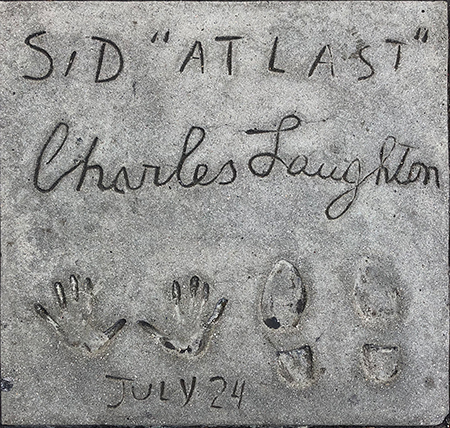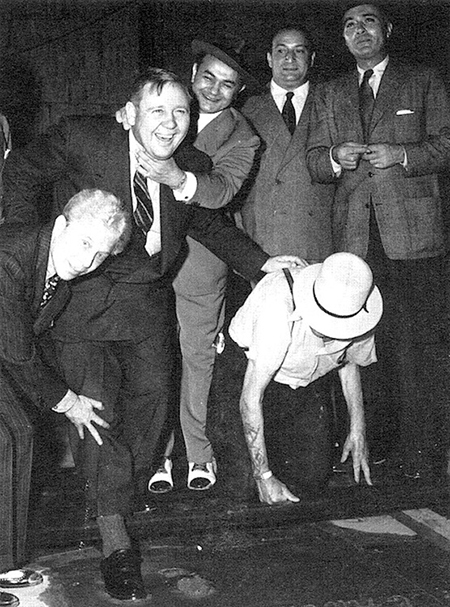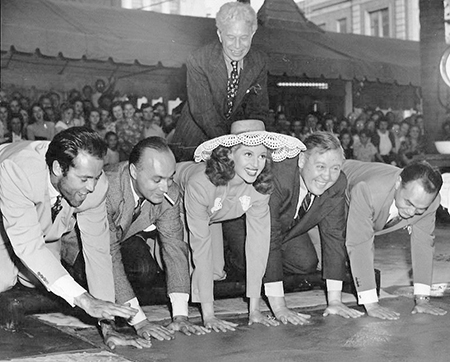 |
 |
|
|
| Charles Laughton with Edward G. Robinson, Charles Boyer, Henry Fonda and Rita Hayworth |
 |
| Forecourt Ceremony held on Friday, July 24, 1942 |
| |
Born: July 1,1899, in Scarborough, England, United Kingdom
Age at the time of the ceremony: 43
Died: December 15, 1962, in Hollywood, California, age 63 |
| |
Charles Laughton burst upon Hollywood with his performance in the first British film to attain wide popularity in the US: The Private Life of Henry VIII, after which, he became known as the greatest "heavy" in films. Owlish and irascable, Laughton eventually became a beloved character actor.
Born to prosperous hotel-keepers, Charles was raised mostly by the staff of the Victoria Hotel. He was educated at Scarborough College, then at Stonyhurst College, a boarding school run by the Jesuits. Laughton served in World War I, with the Huntingdonshire Cyclist Battalion, during which time, he was gassed, resulting in back trouble which would last for the rest of his life.
Returning from the War, Charles undertook management of the family hotel, but also participated in local theatricals, eventually being accepted to the Royal Academy of Dramatic Arts in 1925. Considered too old to begin his traning as an actor, Laughton blew the doors off with his intensity and technique. Claude Rains was a tutor to him, while Alice Gachet taught him to speak French. He made his professional debut in 1926 as Osip in The Government Inspector. In the West End, Laughton made a name for himself in the Chekov plays The Cherry Orchard and Three Sisters. It was during this time that Laughton met Elsa Lanchester, who would become his wife in 1929.
After appearing with Lanchester in three short films written for her by H. G. Wells in 1928, Laughton had a brief role in the feature film Piccadilly (released in June 1929). Starring on Broadway in Payment Deferred in late 1931 brought the attention of the Hollywood studios, with Laughton teaming up with Paramount to play a jealous husband in Devil and the Deep (released in August 1932). Laughton had supporting roles in The Old Dark House (released in October 1932), If I Had a Million (released in December 1932), then played Nero to perfection in The Sign of the Cross (released in February 1932). Now Laughton could carry a film. He played Dr. Moreau in The Island of Lost Souls (released in December 1932), then went to England to film The Private Life of Henry VIII (released in September 1933), which became the first British film to achieve popularity in America. Laughton won the Oscar for his performance.
By now, Laughton had become America's favorite heavy, playing the misguided father in The Barretts of Wimpole Street (released in September 1934), a very odd English butler in Ruggles of Red Gap (released in March 1935), the notorious hard-ass police inspector Javert in Les Misérables (released in April 1935), and finally, what would become his best-remembered role, as Captain Bligh in Mutiny on the Bounty (which played the Chinese in November 1935).
Laughton enjoyed being a free agent, making pictures in England, such as Rembrandt (released in December 1936), and Jamaica Inn (released in October 1939). He closed out the 1930s with
his moving performance as Quasimodo in The Hunchback of Notre Dame (released in December 1939).
Laughton decided to switch gears after Hunchback. In the 1940s, he played a large number of fairly "normal" roles, such as It Started with Eve (released in September 1941), and The Tuttles of Tahiti (released in May 1942).
Charles Laughton participated in a fundraiser, broadcast nationally from the stage of the Chinese, to help Greece fight the Axis Powers. On Staurday, February 8, 1941, the program America Calling: A Salute to the Greek Nation, featured an all-star cast with an orchestra playing songs and arrangements by its conductor, Meredith Willson. Laughton read a telegram of thanks from the Greek Prime Minister, Albert Alexandros Koryzis.
Laughton was one of the five actors from the film Tales of Manhattan to be imprinted on the same day at Grauman's Chinese Theatre. Tales would have its World Premiere at the Chinese two weeks later, in August 1942. He played a comic spirit in The Canterville Ghost (which played the Chinese in October 1944), the title role in Captain Kidd (released in November 1945), and an English Judge in The Paradine Case (played the Chinese in October 1948), and another police inspector in The Man on the Eiffel Tower (released in December 1949).
It seemed that there was just no telling what Laughton would do. From Abbott and Costello Meet Captain Kidd (released in December 1952), to hosting his own television program, This is Chalres Laughton in 1953. He played King Herod in Salome (released in March 1953), and reprised his role as Henry VIII in Young Bess (released in May 1953), then remained in England to work with David Lean on Hobson's Choice (released in April 1954).
During this period, Laughton undertook to direct on the stage, including the pemiere of Galileo in Los Angeles in 1947, Don Juan in Hell on Broadway in 1951, and The Caine Mutiny Court-Martial (with Henry Fonda and Lloyd Nolan as Captain Queeg) in the 1954-1955 season. Laughton's Caine Mutiny producer, Paul Gregory, convinced him to direct the film, The Night of the Hunter (released in November 1955), which flopped, but has since come to be considered a unique masterpeice. Laughton directed and starred in a revival of Shaw's Major Barbara on Broadway in late 1956.
Laughton's last years saw him in play a crusty English barrister in
Witness for the Prosecution (released in February 1958), a German Naval Captain in Under Ten Flags (released in September 1960), an ancient Roman senator in Spartacus (released in October 1960), and a crusty southern senator in Advise and Consent (released in June 1962).
Laughton continued to suffer from back pain, exacerbated by his being overweight. His gall bladder gave him trouble, then a heart attack, followed by heart surgery. In the end, it was bone cancer which finally took him at the age of 63. |
|
|
|
|
| |
 |
 |
| Grauman's Chinese Theatre, Hollywood, California. Charles Laughton Forecourt block. Executed by Jean Klossner, Friday, Kuly 24, 1942. 40 x 39 inches. |
 |
 |
 |
| Grauman's Chinese Theatre, Hollywood, California. Charles Laughton Forecourt ceremony, Friday, July 24, 1942. Sid Grauman provides support to Chales Laughton, who is being choked by Edward G. Robinson, with Tales of Manhattan producer Sam Speigel and Charles Boyer . The man kneeling in white is presumably cement artist Jean Klossner. |
|
 |
 |
 |
| Grauman's Chinese Theatre, Hollywood, California. Charles Laughton Forecourt ceremony, Friday, July 24, 1942. Sid Grauman presides over the co-stars of the film Tales of Manhattan: Henry Fonda, Charles Boyer, Rita Hayworth , Charles Laughton, and Edward G. Robinson. |
|